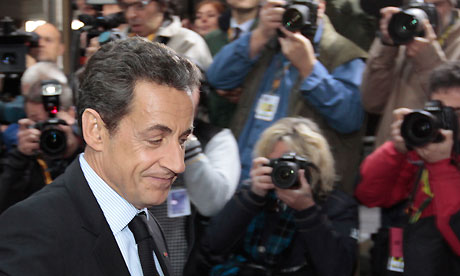Does the EU bailout deal stand up to scrutiny?

Nicolas Sarkozy arrives at last night's summit in Brussels
It's a measure of how desperate the eurozone's plight has become that instead of cooing at his new baby, Nicolas Sarkozy will spend this afternoon on the phone to Beijing, trying to persuade China's president Hu Jintao to stump up some cash for the euro-bailout.
Any deal was better than no deal last night; but in the cold light of day, the question of why China would want to get involved in bankrolling the eurozone's unmanageable debts was just one of the questions emerging.
Another was the size of the bailout fund. Even assuming the participation of China and any other investors who can be persuaded to join in, and a whizzy new insurance scheme for sovereign debts, the über-EFSF will be worth €1tn (£875bn).
Angela Merkel and her colleagues are hoping that by offering insurance on new government debts from Italy, Spain and other troubled countries, they can make the fund's resources go much farther.
But that depends on private investors being confident that this insurance fund will pay out. As Karen Ward, of HSBC puts it, "is the insurance credible? If the economic circumstances arose that would mean a large sovereign is struggling to meet its commitment (either economic or political collapse), would core economies honour their commitment?"
If this insurance option doesn't work, the firepower of the EFSF may not be nearly large enough to contain the fallout from Greece's partial default.
There was also much in last night's deal to show that banks, and their mindset, still have a stranglehold on the way Europe runs its economic affairs.
In order to persuade bondholders (mainly banks) to agree to a €100bn "haircut" on the Greek debts they hold – one of the sticking points that kept the talks going late into the night – eurozone governments were forced to promise up to €30bn in sweeteners, or "credit enhancements".
It's not yet clear how these sweeteners will work, and the talks with investors over the details will go on for weeks. But the banks have effectively been able to dictate the terms, because everyone is desperate to avoid a so-called "credit event", which would trigger many billions of pounds' worth of credit default swaps and other complex bets between financial institutions, potentially destabilising the entire banking sector.
The eurocrats have also taken a leaf out of the banks' books by planning to set up a new "special purpose investment vehicle" ("spiv" for short, oh dear), as part of the rescue package. It's not yet clear exactly how it will work, but it's expected to hold some of the dodgy debts of "impaired" nations such as Portugal and Greece, and fund itself by issuing bonds to investors – including, hopefully, the Chinese.
http://www.guardian.co.uk/business/e...rutiny-critics

Nicolas Sarkozy arrives at last night's summit in Brussels
It's a measure of how desperate the eurozone's plight has become that instead of cooing at his new baby, Nicolas Sarkozy will spend this afternoon on the phone to Beijing, trying to persuade China's president Hu Jintao to stump up some cash for the euro-bailout.
Any deal was better than no deal last night; but in the cold light of day, the question of why China would want to get involved in bankrolling the eurozone's unmanageable debts was just one of the questions emerging.
Another was the size of the bailout fund. Even assuming the participation of China and any other investors who can be persuaded to join in, and a whizzy new insurance scheme for sovereign debts, the über-EFSF will be worth €1tn (£875bn).
Angela Merkel and her colleagues are hoping that by offering insurance on new government debts from Italy, Spain and other troubled countries, they can make the fund's resources go much farther.
But that depends on private investors being confident that this insurance fund will pay out. As Karen Ward, of HSBC puts it, "is the insurance credible? If the economic circumstances arose that would mean a large sovereign is struggling to meet its commitment (either economic or political collapse), would core economies honour their commitment?"
If this insurance option doesn't work, the firepower of the EFSF may not be nearly large enough to contain the fallout from Greece's partial default.
There was also much in last night's deal to show that banks, and their mindset, still have a stranglehold on the way Europe runs its economic affairs.
In order to persuade bondholders (mainly banks) to agree to a €100bn "haircut" on the Greek debts they hold – one of the sticking points that kept the talks going late into the night – eurozone governments were forced to promise up to €30bn in sweeteners, or "credit enhancements".
It's not yet clear how these sweeteners will work, and the talks with investors over the details will go on for weeks. But the banks have effectively been able to dictate the terms, because everyone is desperate to avoid a so-called "credit event", which would trigger many billions of pounds' worth of credit default swaps and other complex bets between financial institutions, potentially destabilising the entire banking sector.
The eurocrats have also taken a leaf out of the banks' books by planning to set up a new "special purpose investment vehicle" ("spiv" for short, oh dear), as part of the rescue package. It's not yet clear exactly how it will work, but it's expected to hold some of the dodgy debts of "impaired" nations such as Portugal and Greece, and fund itself by issuing bonds to investors – including, hopefully, the Chinese.
http://www.guardian.co.uk/business/e...rutiny-critics

Comment